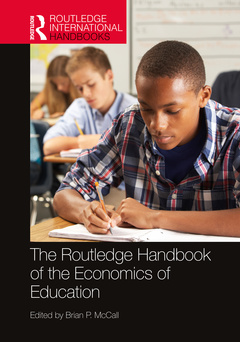Description
The Routledge Handbook of the Economics of Education
Routledge International Handbooks Series
Coordinator: McCall Brian P.
Language: English
Subjects for The Routledge Handbook of the Economics of Education:
Keywords
Pay For Performance; education economics; OLS Regression; economics of education; Randomly Assigned; returns to education; Postsecondary Education; returns to human capital; Teacher Labor Markets; demand for education; Stem Major; education provision; Regression Discontinuity Design; labor market outcomes; College Major Choice; education as investment; Charter Schools; education as consumption; Stem Degree; GDP and education; Wealth Shocks; human capital theory; Universal pre-K Program; signalling; Average Peer Ability; screening; DD Approach; education financing; Student Loan Defaults; underschooling; Federal Student Aid; overschooling; Grade Point Average; education market; High School GPA; Intensive Margin; Civil Service Teacher; Observed Student Characteristics; Meet Project; Milwaukee Voucher Program; Improve Student Outcomes; Lottery Studies
Publication date: 09-2023
· 17.4x24.6 cm · Paperback
Publication date: 12-2021
· 17.4x24.6 cm · Hardback
Description
/li>Contents
/li>Readership
/li>Biography
/li>
The economics of education is a burgeoning area of study, employing increasingly sophisticated analytical tools to answer questions with high societal impact. Thus, the aim of this handbook is to provide readers with an up-to-date overview of the current state of the field of the economics of education and its main areas of research.
This comprehensive handbook provides an authoritative overview of key theoretical and policy areas, covering topics like econometric methods for education economics, returns to education, competition in education provision, education and economic growth, and education and inequality. It reviews the current state of research from early childhood through postgraduate education as well as adult education and life-long learning. Offering a truly international perspective, the handbook benefits from a global group of contributors and attention to both developed and developing country contexts.
The Routledge Handbook of the Economics of Education will be a valuable resource for advanced students, researchers, and policymakers across economics, education, and public policy.
Introduction (Brian P. McCall); 1. Econometric methods for education (Luc Behaghel and Maria Florencia Pinto); 2. Early childhood education in the United States: what, when, where, who, how, and why (Elizabeth U. Cascio); 3. Nearly three decades into the charter school movement, what has research told us about charter schools? (Ron Zimmer, Richard Buddin, Sarah Ausmus Smith, and Danielle Duffy-Chipman); 4. School accountability (Jason Burns and Katharine O. Strunk); 5. Evaluating teacher effectiveness: a review of historical developments and current trends (Christopher D. Brooks and Matthew G. Springer); 6. Is education different? A review of the voucher literature and lessons for implementation (Dennis Epple, Richard E. Romano, and Miguel Urquiola); 7. Teacher labor markets: what have we learned over the last decade? (Jessalynn James and James Wyckoff); 8. Teacher labor markets in developing countries (Lee Crawfurd and Todd Pugatch); 9. School resources and educational outcomes in developing countries (Paul Glewwe, Celestine Siameh, Bixuan Sun, and Suzanne Wisniewski); 10. Peer effects in education (Angela Cools and Eleonora Patacchini); 11. Socioeconomic inequalities in education beyond the early years (Claire Crawford, Lindsey Macmillan, and Gill Wyness); 12. Factors shaping college investment and enrollment gaps (George Bulman and Jesse Cunha); 13. Vocational education: an international perspective (Celeste K. Carruthers and Christopher Jepsen); 14. College persistence and bachelor’s degree completion (Brian P. McCall); 15. College majors (Arpita Patnaik, Matthew Wiswall, and Basit Zafar); 16. Student loan borrowing and repayment decisions: risks and contingencies (Kartik Athreya, Christopher Herrington, Felicia Ionescu, and Urvi Neelakantan); 17. For-profit colleges in the United States: insights from two decades of research (Stephanie Riegg Cellini); 18. Competition in higher education (Michael Kaganovich, Sinan Sarpca, and Xuejuan Su); 19. Education and economic growth (Anna Valero)
Brian P. McCall is Professor of Education, Economics, and Public Policy at the University of Michigan in Ann Arbor. He is a former co-editor of Economics of Education Review. His current research interests in the economics of education include the effect of scholarships on college persistence, completion, and earnings, the effect of college enrollment delay on college completion, and the impact of the Great Recession on educational attainment and earnings. He received his PhD in economics from Princeton University in 1988.




